Congratulations to Abhishek Mitra, Shreya Verma, and Mukunda Mandal for receiving Travel Awards
Abhishek Mitra and Shreya Verma received Windt Graduate Student Travel Awards and Mukunda Mandal received the Kharasch Postdoctoral Travel Award.

Pictured: Abhishek Mitra, Shreya Verma, Mukunda Mandal
The Gagliardi Group embarks on a two-day retreat
During the retreat, the group engaged in fruitful discussions about science and participated in collaborative brainstorming.
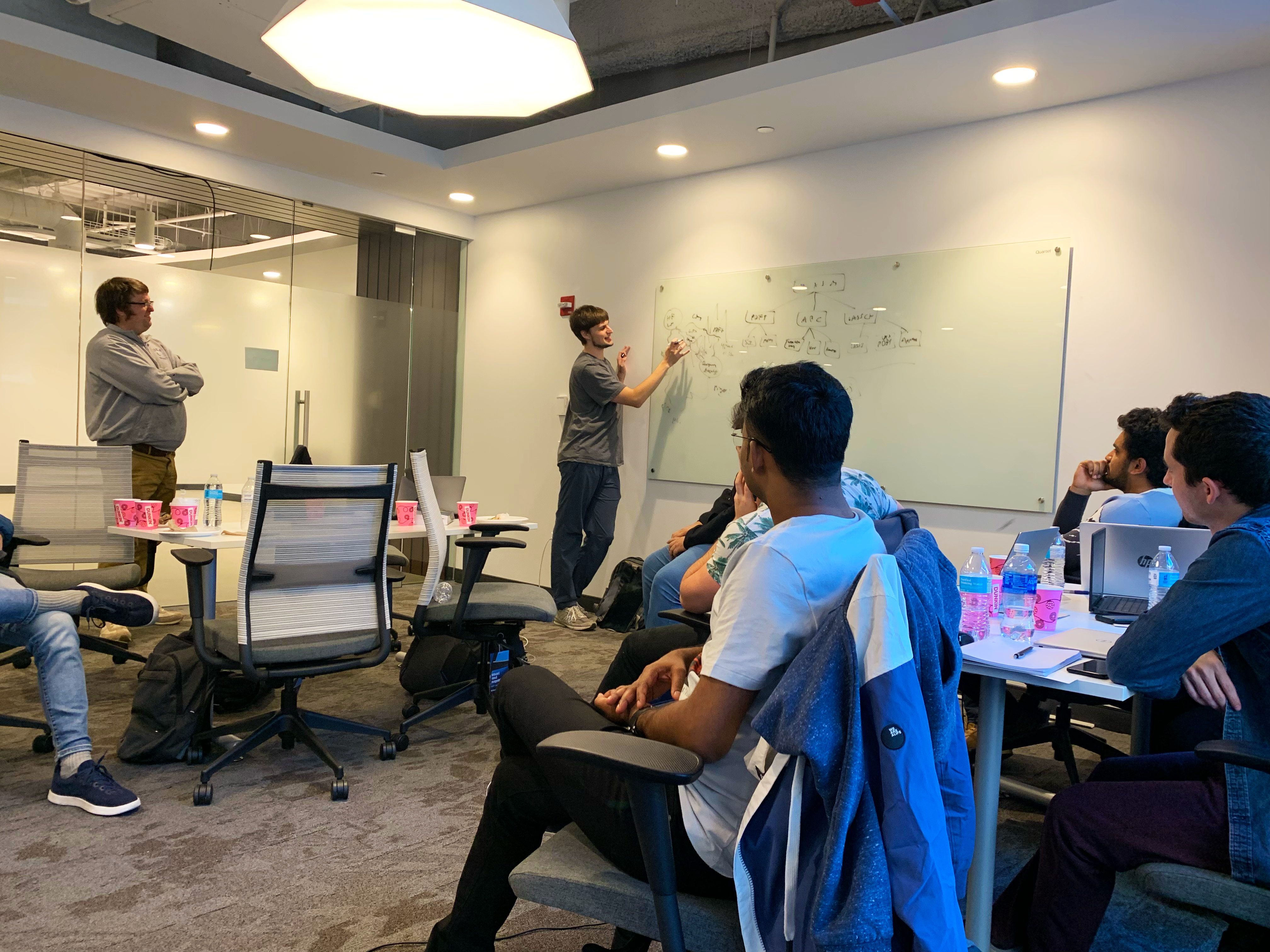
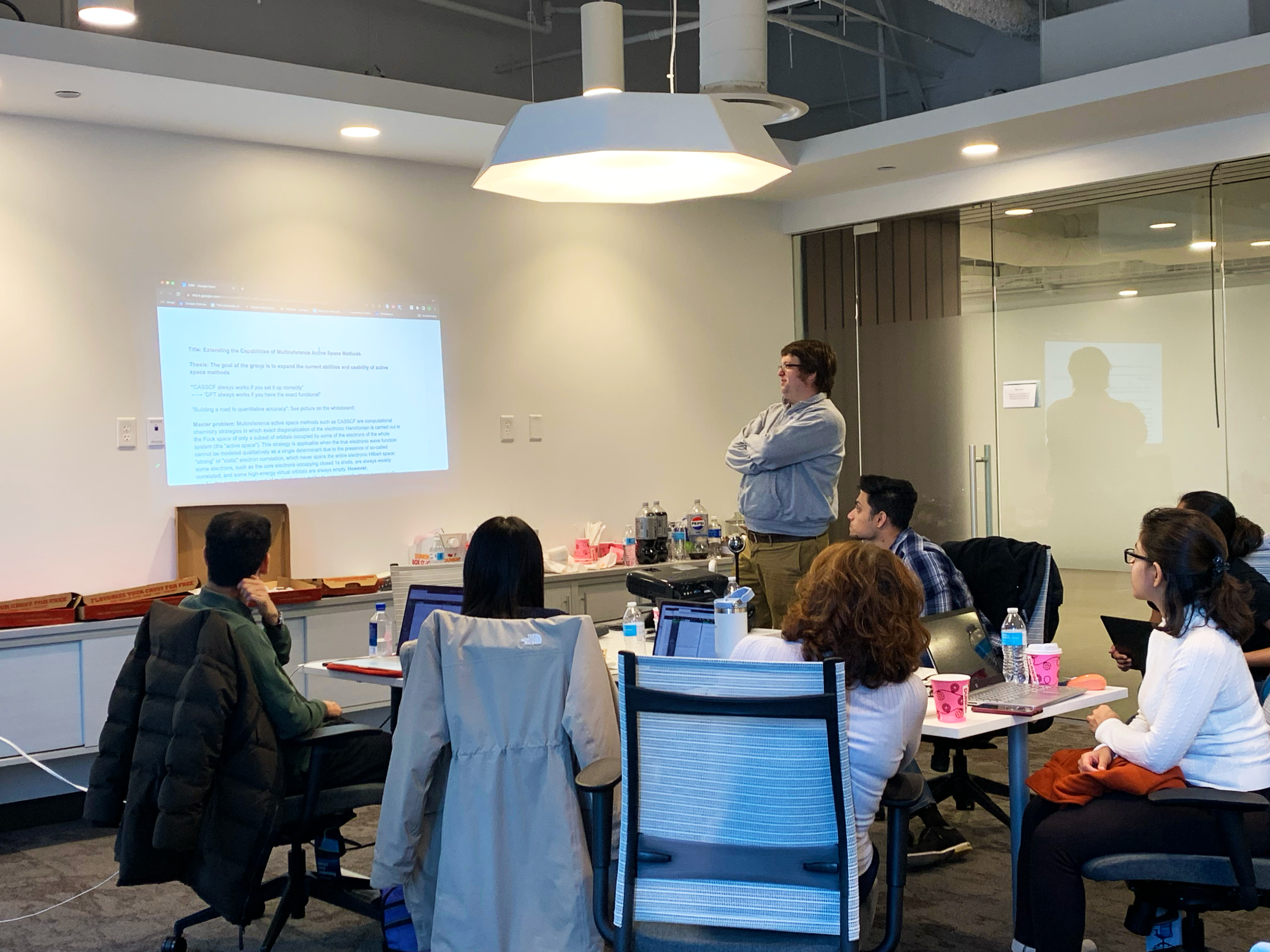
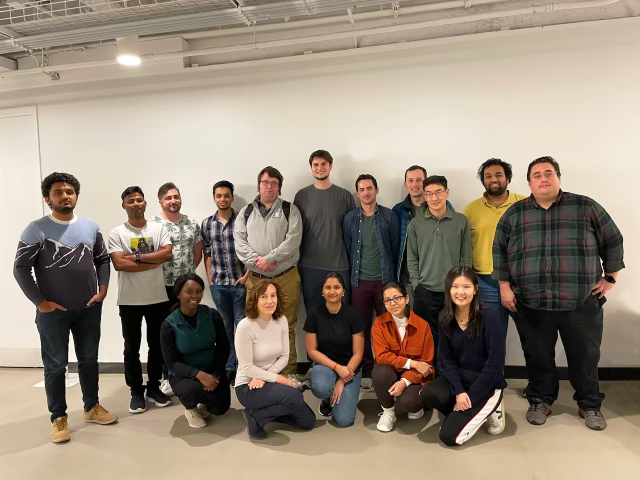

Congratulations to Bhavnesh Jangid and Jacob Wardzala upon passing their candidacy exams


The Gagliardi Group congratulates Bhavnesh Jangid and Jacob Wardzala on their achievement in passing their candidacy exams! Bhavnesh’s work focuses on the “Development of quantum embedding based methods for efficient and accurate prediction of the core-level spectroscopy” and Jacob’s focuses on “Automated active space selection for systematic multireference calculations in reactivity”. The Gagliardi group wishes you both continued success as you progress in your academic endeavors.
Farewell Announcement: Dr. Arup Sarkar departs from the Gagliardi Group

The Gagliardi Group wishes farewell to Dr. Arup Sarkar as he takes the next steps in his career. We wish you all the best for your future endeavors and have no doubt that you will achieve great success!
Double the Cheers, Double the Joy
The Gagliardi Group celebrates not just one but two group members. We are wishing a very Happy Birthday to Valay Agarawal, our brilliant PhD student, and Soumi Haldar, our dedicated postdoctoral researcher. Here’s to many more moments of working well together and achieving great things!


Laura Gagliardi is featured on Inside Quantum Technology News’ Women of Quantum Technology series

Laura Gagliardi is featured on Inside Quantum Technology in an interview where she discusses her journey from Italy to the US, her passion for the field of Quantum Chemistry and the vital role of theoretical chemistry in shaping the future of the field. Read full publication here.
Gagliardi Group says Farewell to Gautam Stroscio
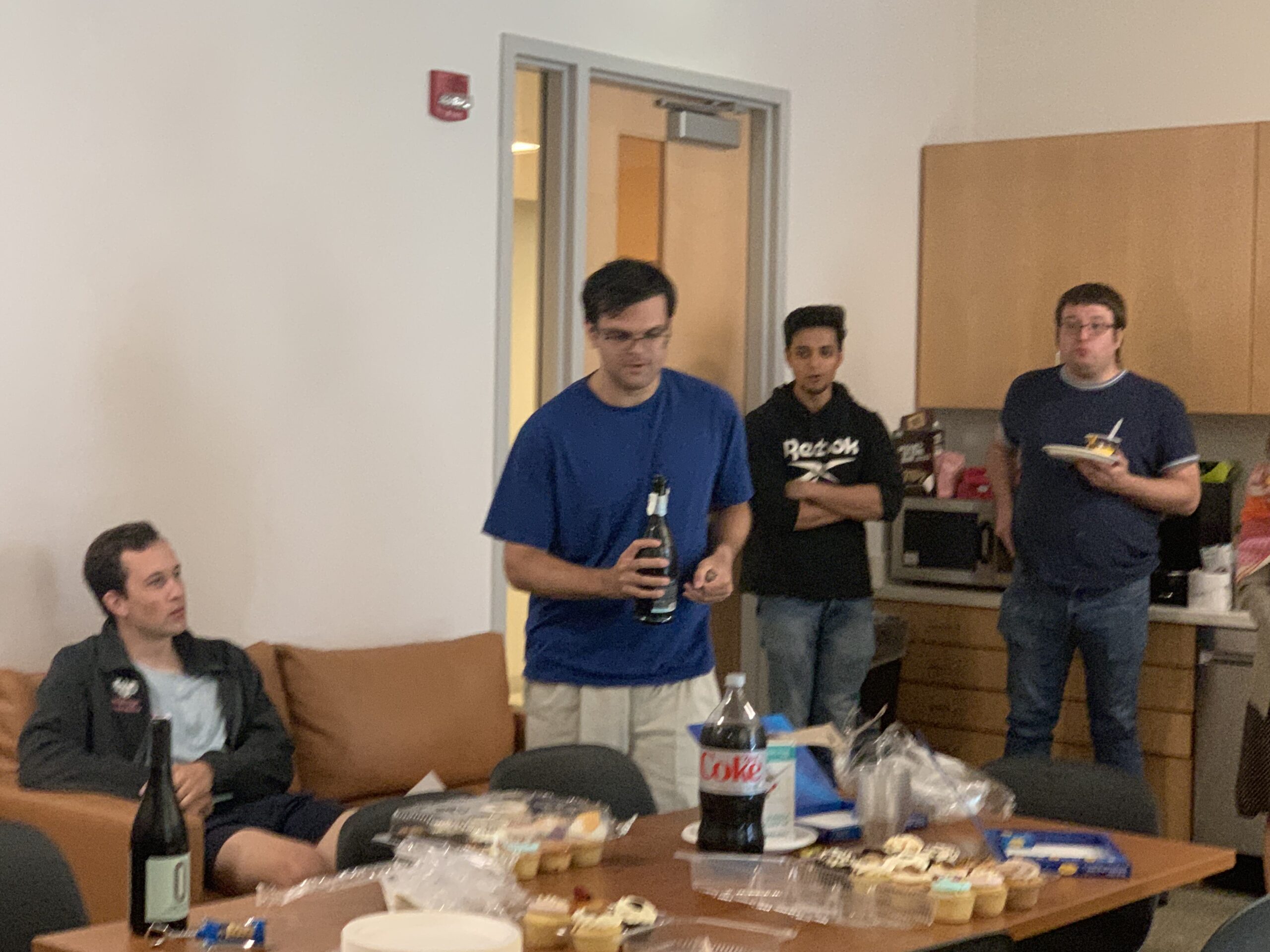
It’s with mixed emotions that we bid farewell to our brilliant colleague, Gautam Stroscio, as he embarks on a new adventure. After making valuable contributions to the Gagiardi Research Group, Gautam is taking his talents to the Lawrence Livermore National Laboratory.
Shreya Verma Receives Honorable Mention in the 2022-23 PME Outstanding Teaching Assistant Awards
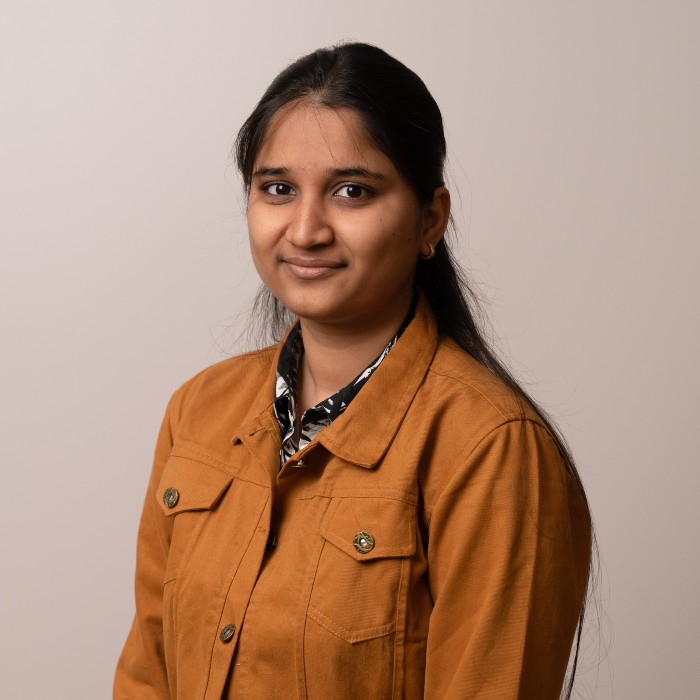
The Gagliardi group congratulates Shreya Verma for achieving honorable mention in the 2022-23 Pritzker School of Molecular Engineering Outstanding Teaching Assistant Awards. Shreya has earned this recognition for her exemplary service as a Teaching Assistant for the course MENG 25510 – Quantum Molecular and Materials Modeling.
Saumil Chheda and Benjamin Yeh successfully graduate from the University of Minnesota
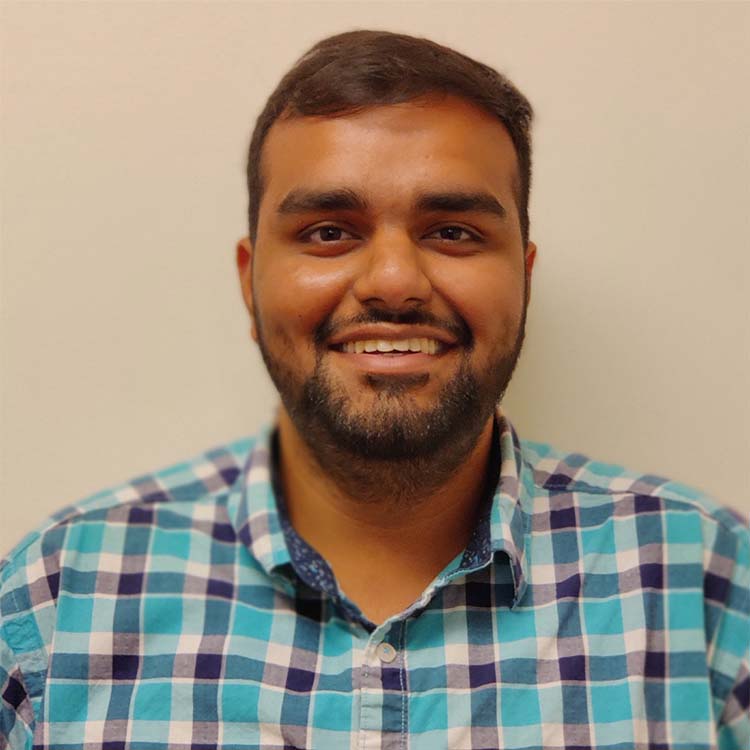

Join us in celebrating the graduation of Saumil Chedda and Benjamin Yeh from the University of Minnesota. Saumil’s next position will be as a Postdoctoral Fellow in Climate Change, Machine Learning, and Advanced Materials at the Bakar Institute of Digital Materials for the Planet in University of California Berkeley, under the guidance of Professor Omar Yaghi. Ben’s next position will be as a Process Development/Scale-Up Engineer at ExxonMobil in Baytown, Texas.
Striking Pins and Camaraderie with the Gagliardi Group
The Gagliardi Research Group enjoy an evening of camaraderie and pin-crashing fun as they slipped on their bowling shoes in an unforgettable outing of friendly competition! Strikes, spares, and the occasional gutter ball brought cheers and laughter echoing through the bowling alley as friendships strengthened and new bonds formed. A successful team not only thrives on shared academic pursuits but also on shared experiences of joy and amusement.
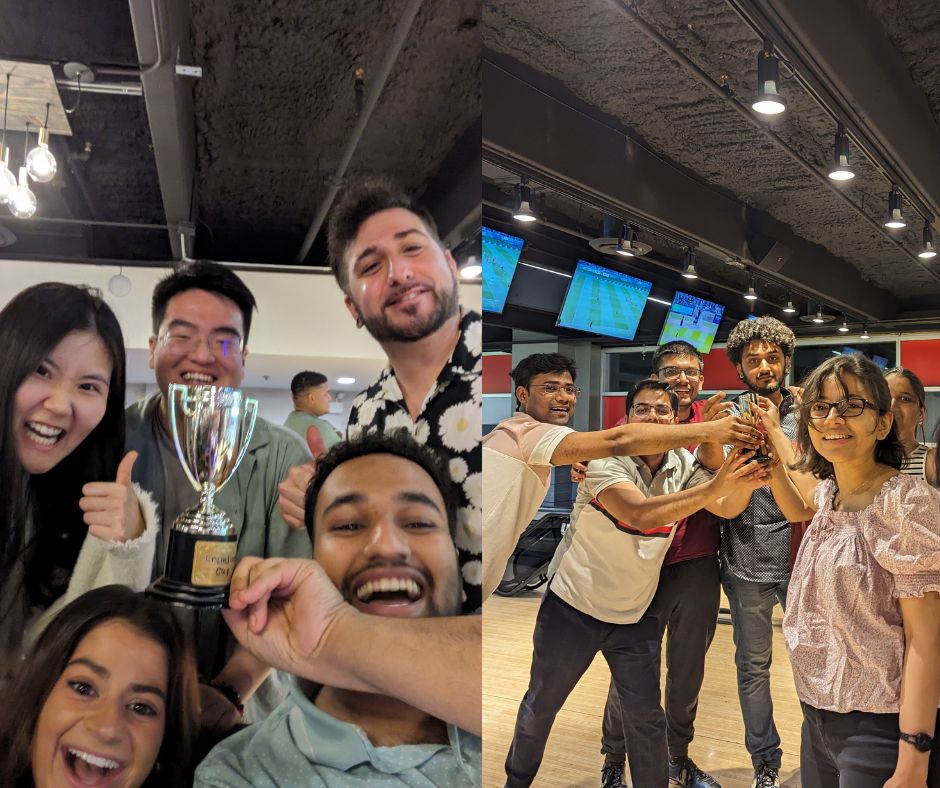
Gagliardi group welcomes four new summer student researchers!
Gagliardi group welcomes four first-year graduate students for summer rotations. The students will be paired with mentors in the Gagliardi Group to gain research experience in theoretical chemistry.
- Serina Tressler, mentored by Dr. Mukunda Mandal
- Alex Hoehn, mentored by Valay Agarawal
- Brian Wang, mentored by Shreya Verma
- Aniruddha Seal, mentored by Matthew Hennefarth
Farewell Announcement: Dr. Paul Calio Departs from the Gagliardi Group
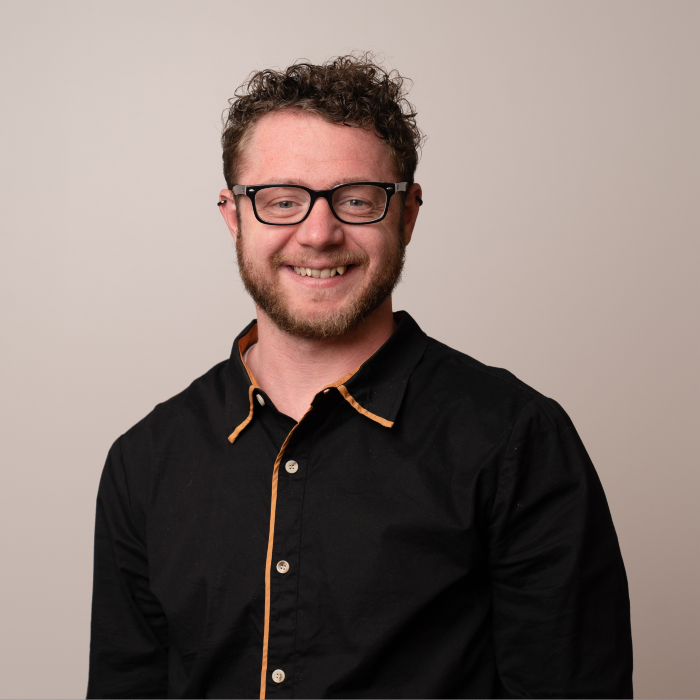
The Gagliardi Group bids a bittersweet farewell to Dr. Paul Calio as he embarks on a new chapter in his career. We express our appreciation for his work and positive influence.
Alfreda Grace Joins Gagliardi Group

Alfreda Grace joins the Gagliardi Group as its new Managing Director. Welcome, Alfreda!
Matthew Hennefarth has received the Olshansky Graduate Student Travel Award.
Matthew will use it to attend the 17th INTERNATIONAL CONGRESS OF QUANTUM CHEMISTRY. https://icqc2023.org
Where he will present a poster on his research on linearized pair-density functional theory.
Way to go Matt!
Daniel King receives the Eugene Olshansky Memorial Fellowship for Excellence in Research
Daniel studies the automation of multiconfigurational methods for high-throughput computation, and uses this data to further computational methodologies with data science and machine learning. He also works with experimentalists to accelerate data-driven improvement in transition metal catalysis.
Dr. Mukunda Mandal has joined the Gagliardi Group!
Mukunda Mandal has joined the group as a postdoc, most recently a postdoc at Max Planck Institute for Polymer Research, Germany
He is interested in Electronic Structure, Catalysis, and Reticular Frameworks. Welcome Mukunda!
Matthew Hennefarth has received an NSF Graduate Research Fellowship Program (GRFP) award
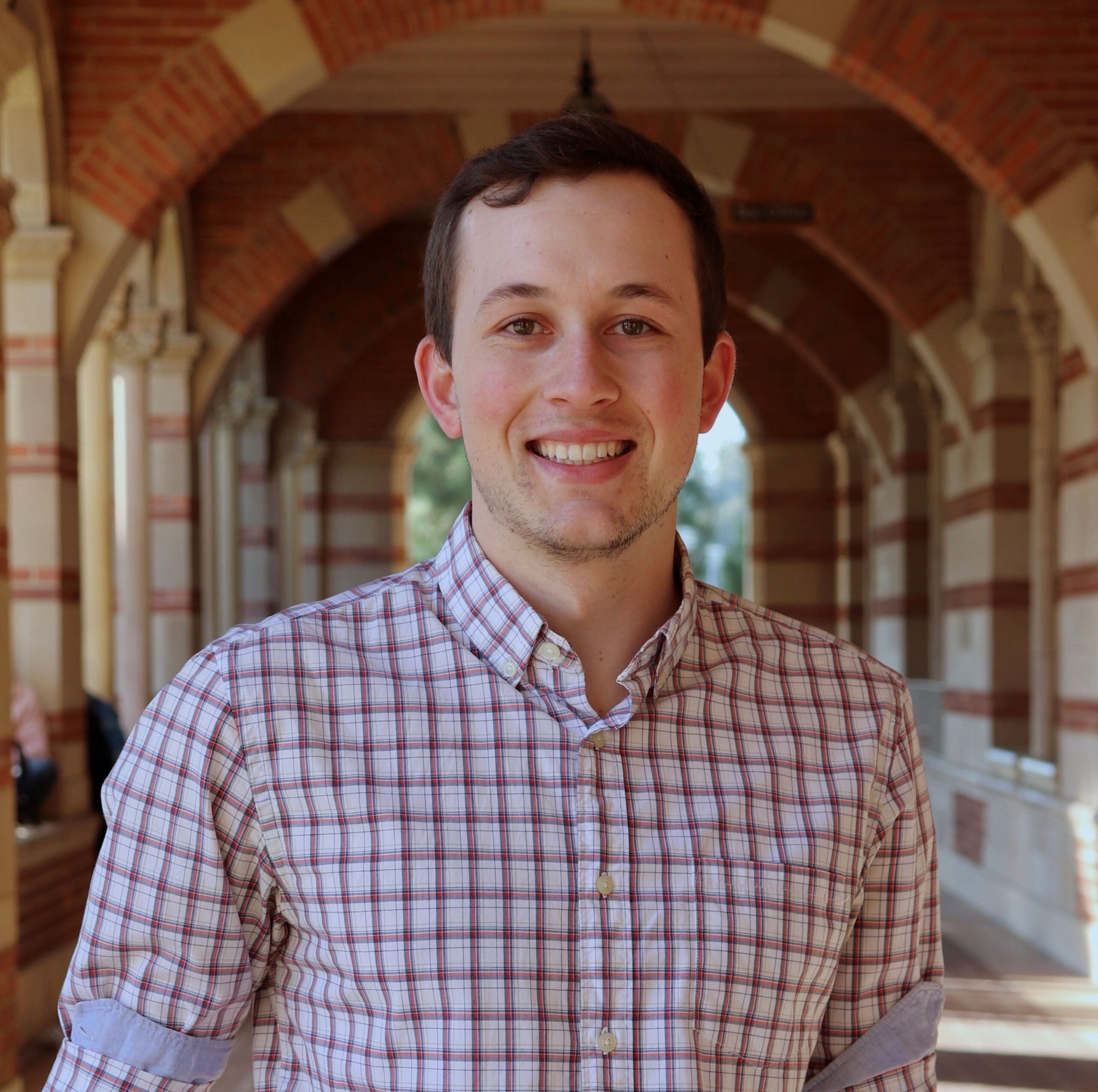
Graduate student Matthew Hennefarth has received a National Science Foundation (NSF) Graduate Research Fellowship. This award will support him for the next 3 years as he works on developing multi-state pair-density functional theory for non-adiabatic molecular dynamics. Congratulations!
You can find out more about the award here: https://www.nsfgrfp.org.
Collaboration between the Gagliardi Group and Argonne boosts development of sustainable technology
Laura and graduate student Daniel King collaborated with the group of Max Delferro at Argonne National Laboratory to develop a better method for finding novel MOF catalysts, which have the potential to speed up industrially relevant chemical reactions. Increasing the efficiency of catalysts is critical for developing sustainable solutions and promoting decarbonization. The group used machine learning algorithms combined with high-throughput experimentation to screen different metals, temperatures, and pressures applied to the MOF NU-1000 for catalytic activity. After 2,000 reactions, the collaboration used this process to ultimately improve the yield of these chemical reactions from 0.4 percent to 24.4 percent. Read the article here.
Ariadna Fernandez reflects on her experience as a Open Quantum Initiative Fellow with Gagliardi Group
Ariadna Fernandez, a senior computer science student at University of Illinois at Chicago, visited the Gagliardi group during the summer of 2022 as a Chicago Quantum Exchange (CQE) Open Quantum Initiative Fellow. Her latest blog reflects on her experience from discovering the opportunity on Discord to running quantum simulations. It was a pleasure having you with us, Ariadna!
Gagliardi group selected as QNEXT’s Images of the Week
The Gagliardi group’s work, as part of the Next Generation Quantum Science and Engineering (Q-NEXT) project, has been selected as the “Images of the Week”. Established in 2020, Q-NEXT brings together roughly 100 experts from three national laboratories, 10 universities and 14 technology companies to develop the science and technology for controlling and distributing quantum information, enabling pivotal discoveries and U.S. competitiveness in quantum science and engineering. Bravo!

Gagliardi group welcomes a new post doc and two graduate students!
The Gagliardi group is growing! We are delighted to welcome Andrea Darù as a post doc within our group and our newest graduate students: Bhavnesh Jangid and Jacob Wardzala.
The Gagliardi group cheers Aleksandr Lykhin’s new job and bids farewell to Francesca Fasulo!
The Gagliardi group had much to celebrate at our 2022 Holiday Party! We cheered postdoc Aleksandr Lykhin‘s new Computational Scientist – Data Security Engineer position with the Research Computing Center at the University of Chicago and bid farewell to visiting graduate student Francesca Fasulo.

Teffanie Goh selected as the recipient of the Olshansky Graduate Student Travel Award
Graduate student, Teffanie Goh, is selected as one of the recipients of a Department of Chemistry Graduate Student Award. The Olshansky Graduate Student Travel Award is part of a group of Department of Chemistry awards at the University of Chicago that provides funding to help defray registration and conference costs for students and postdocs presenting at scientific conferences. Bravo, Teffanie!
Four second year graduate students pass their candidacy exam!
Valay Agarawal, Matthew Hennefarth, Zihan Pengmei, and Shreya Verma passed their candidacy exams. Congratulations to the four of them!
